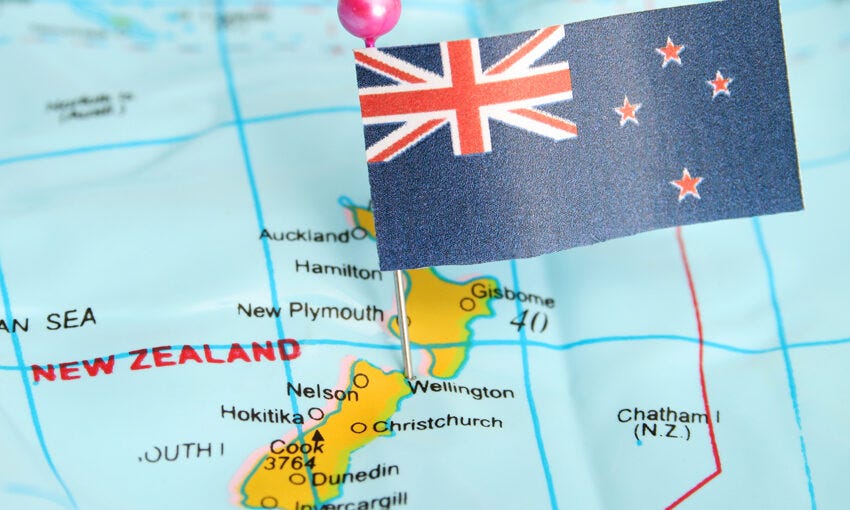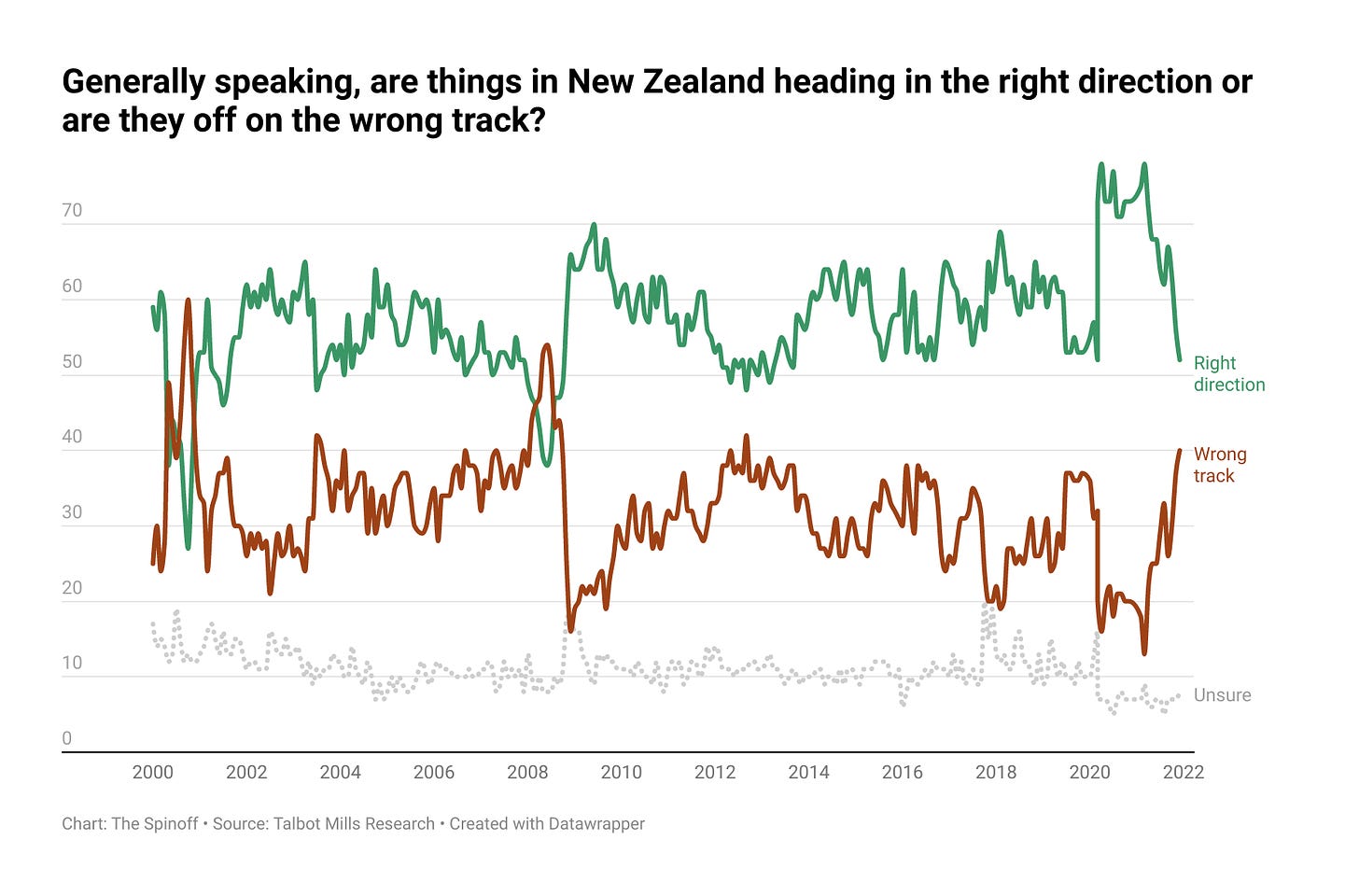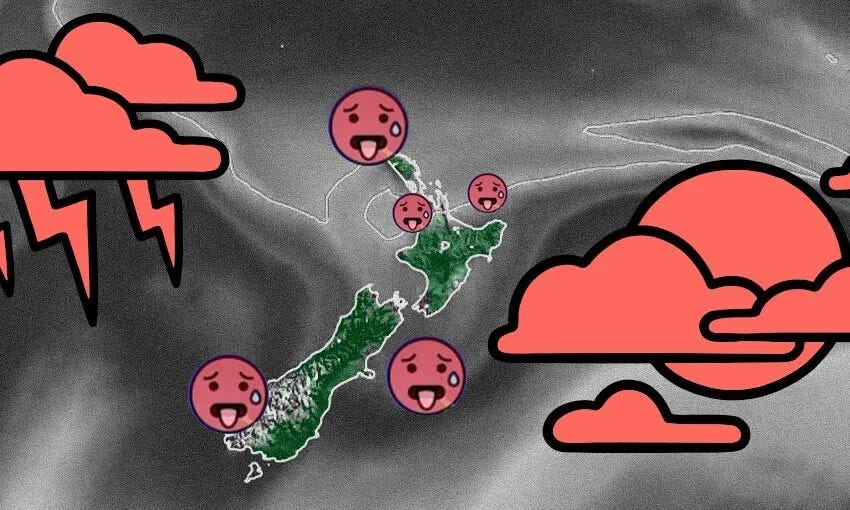New Zealand’s case for optimism
For two decades polls have shown this country has held a nearly unshakeable belief, unique among democracies, that the future will always be better
Mōrena and welcome to The Bulletin for Friday, February 11, by Justin Giovannetti. Presented in partnership with Z Energy.
In today’s edition: New test-to-return system for close contacts; police warn of days more protest at parliament; a date for Costco’s opening; but first, the one happy country.
There’s a special bond between New Zealanders and their institutions. (Getty Images)
The one consistently satisfied democracy. There’s one statistic that sets New Zealand apart from nearly all other western democracies. When asked if your country is on the right track, most of the world’s citizens respond with a resounding no. Sometimes events conspire to make the majority happy for a few weeks or months, before malaise sets back in. New Zealanders are the glaring anomaly. For the past two decades, the citizens of Aotearoa have answered yes nearly every time they’ve been asked if things are heading in the right direction—the one exception was during the global financial crisis and happiness quickly came roaring back.
What’s going on? Talbot Mills Research has been asking New Zealanders the right direction question for years. I asked Stephen Mills, the executive director of the polling firm, if he could explain what the chart above means. While Talbot Mills provides polling for the Labour party, there isn’t a partisan link between New Zealanders and their satisfaction. Whether the occupant of the prime minister’s office was Helen Clark, John Key, Bill English or Jacinda Ardern, a consistent majority were happy.
“It varies from broadly happy to hysterically happy,” said Mills. “New Zealand has basically been happy since Helen Clark was elected. The economic numbers have varied in that time. I always took it as a sign of broad satisfaction, that people didn’t need to worry about the country being governed properly. They didn’t have to agree with the prime minister, but they felt the country was going the right way and the government was basically competent.”
Where are we now? It does feel odd writing this story as a vocally aggressive protest outside parliament is in its third day. During the first year of Covid-19, despite a pandemic, recession and closed border, a record number of New Zealanders gave the country a thumbs up. That enormous surge in support has now evaporated and the country has gone back to being merely content. By global standards, that’s an incredible place to be. The World Economic Forum looked at citizen satisfaction a few years ago and found that despite years of healthy economic growth, longer lives and some of the safest societies in human history, most citizens of democracies were extremely unhappy with things.
A very different result across the Pacific. The result of American being asked the right direction question is nearly the opposite of New Zealand. One poll in June 2009 found a majority happy, otherwise they’ve been quite pessimistic for decades. Less than a quarter of Americans currently think their country is doing well, MSNBC has looked at why nearly everyone thinks things are on the wrong track. Partisanship, polarisation and a loss of faith in the future is at the core of it.
The international situation also points towards falling trust for nearly all institutions. Edelman, the world’s largest public relations firm, has been asking people for years about trust in their institutions. The firm’s 2022 trust barometer found that distrust is now the default view around the world, with a near total collapse in optimism across developed countries. Leading the decline are government officials and journalists, who are deeply distrusted around the world. The only institution that’s still seen in a positive light globally is business. New Zealand wasn’t part of the trust barometer, but it seems likely it would once again be an outlier. The last time the trust survey was conducted here was in 2020. This was the top-line conclusion: “New Zealanders trust their government more than any other nation in the world.”
The question of optimism in New Zealand and trust in the country’s institutions is a topic The Bulletin will look at further in 2022. Regardless of your politics, the country’s positive outlook is worth understanding, celebrating and fortifying if necessary.
Quality journalism shouldn’t be a privilege. This is why we are determined to keep our content freely available without a paywall. Help us continue to do so by joining The Spinoff Members today.
Is your organisation keen to support The Spinoff? We would love to hear from you – contact us today to find out more about our organisation memberships.
Businesses asked to register critical workers as government unveils test-to-return scheme. Workers in key roles across the economy, in food production, running supply chains and public services will be able to end self-isolation early if they are close contacts of Covid-19 cases. As Stuff reports, those workers will have access to daily rapid tests and won’t need to stay home for a week (or longer) after being close to a case. The scheme won’t kick in until the omicron outbreak enters the second phase, when thousands of daily cases are expected. However, critical workers won’t be exempt from isolation if they test positive.
There were a record 306 new Covid-19 cases yesterday. The Spinoff’s Covid data tracker has the latest figures.
Over 122 arrests at parliament as towing of protest vehicles starts. Police warn it could take days to clear protesters from parliament’s grounds and the surrounding streets as they’ve struggled to communicate with a leaderless occupation, RNZ reports. The protest is “unprecedented” according to police and officers have been assaulted during confrontations. While NZ First leader Winston Peters gave the protest his tacit support yesterday, no sitting MP has. National MP Maureen Pugh came closest, but retracted her support and told Stuff she didn’t realise the group outside parliament for the past three days opposed Covid-19 vaccinations.
Is being passive the right approach? The prime minister has said the protest will pass, but Bernard Hickey writes in The Spinoff that a hands-off approach to vaccine misinformation and intolerance no longer makes sense.
Westport told to evacuate as record-breaking rainfall closes roads. RNZ reports that Westport has been completely cut off as flood waters threaten low-lying areas. A state of emergency was last declared only last week due to a different storm. Only 10 days into February, it’s already the wettest month on record in Westport. As of this morning, it appears some areas of the town might have escaped significant flood damage.
Richard Hills won’t run for Auckland mayor. The left-leaning councillor was expected to mount a campaign with Labour’s endorsement, but he’s now ruled it out. As Toby Manhire writes in The Spinoff, the decision likely boosts the profile of Efeso Collins, who is also keen on getting the party’s nod. Stuff reports that Hills had a campaign team ready and Labour support lined up, but chose not to enter the race because of his young family. It’ll likely be a colourful campaign, with restaurateur Leo Molloy already preparing for a punch up.
Covid has delayed Costco’s reopening plans, but the retailer promises the day will soon come. A late August opening is now planned for New Zealand’s first Costco, the NZ Herald (paywalled) reports. However that could be delayed by any changes at the country’s border. Costco says it needs to bring in staff from overseas to train local workers and buy the needed supplies. I’m still waiting on Ikea’s opening, which is planned for some time in the “next few years.”
Got some feedback about The Bulletin, or anything in the news?
Get in touch with me at thebulletin@thespinoff.co.nz
Right now on The Spinoff: Gabi Lardies asks how long the uncomfortable heat and humidity can last. Madeleine Chapman ranks all the fish and chip sides. Toby Manhire reports on whether aged care homes are ready for omicron. Alexander Stronach speaks with fantasy writer NK Jemisin about where the magic comes from.
For a longer read, the history of grumbling. “We are almost universally unhappy.” While those words could apply to many places in 2022, right or wrongly, they were written in 1769. The Georgian age was one of the first where the common people where both aware of the changing times and leaving significant permanent records of their thoughts on them. Lapham's Quarterly has looked at what drove people to pen such memorable lines as these: “What doleful days! What driveling times are these!” For all the pessimism, it doesn’t look too bad in retrospect. Echoing the feature at the top of this newsletter, our current doldrums might also look silly seen in the far future.
The woeful state of international cricket at the moment. RNZ reports on a “terribly underwhelming summer” of cricket for the Black Caps, who following a year of roaring success, now plan to play… the Netherlands. First, there are an upcoming series of matches against South Africa, but skipper Kane Williamson is skipping them to rest up for his return to Indian premier league play.








Thank you for your factual, evidenced based story about the public trust in the NZ government. It is very heartening to read while there Is a tiny minority of “aggressive protest(res) outside parliament”. Your story is important in that it affirms what is true—the vast majority are happy with their government.